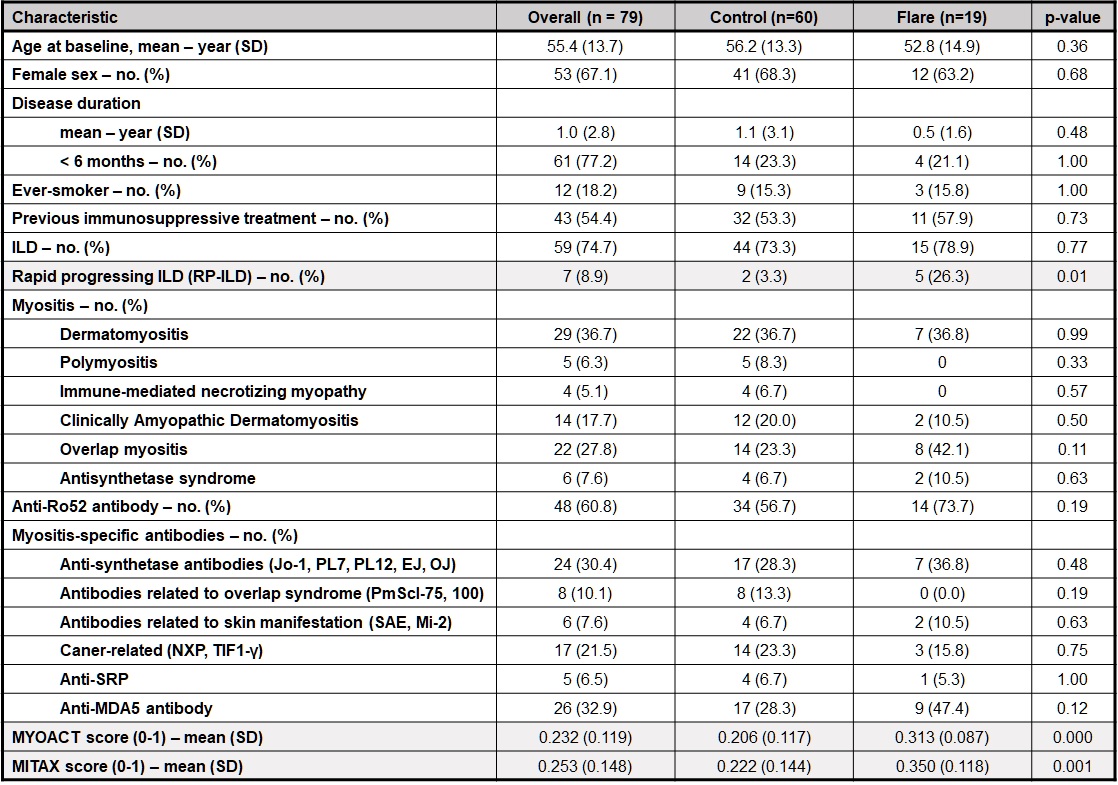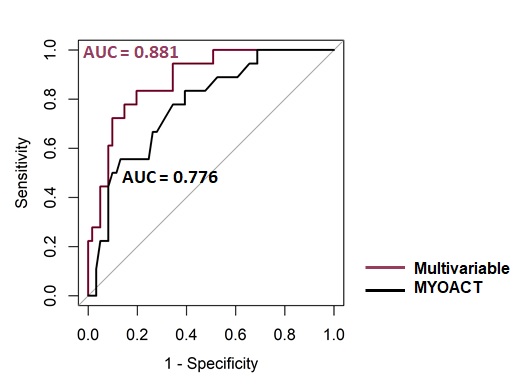Session Information
Date: Saturday, November 16, 2024
Title: Muscle Biology, Myositis & Myopathies – Basic & Clinical Science Poster I
Session Type: Poster Session A
Session Time: 10:30AM-12:30PM
Background/Purpose: To investigate whether serum levels of cytokine and chemokine can predict a treatment response in patients with idiopathic inflammatory myositis (IIM)
Methods: This study included 79 patients with active IIM who requires treatment intensification from a single-center, prospective cohort in South Korea. All patients were classified into one of the following subtypes of IIM according to the established criteria: dermatomyositis, polymyositis, immune-mediated necrotizing myositis, anti-synthetase syndrome, and overlap myositis. Disease activity of IIM was assessed using Myositis Intention-to-Treat Activity Index (MITAX) and Myositis Disease Activity Assessment tool (MYOACT) scores. Serum sample of each patient was obtained at the time of enrollment. We measured the level of following cytokines and chemokines using a bead-based multiplex immunoassays: IL-1β, TNF-α, IL-6, IP-10, IFN-λ1, IL-8, IL-12p70, IFN-α2, IFN-λ2/3, GM-CSF, IFN-β, IL-10, IFN-γ, IL-13, Monocyte Chemoattractant Protein-1 (MCP-1), IL-2, IL-18, Macrophage Inflammatory Protein (MIP) 1B and 1A. The main outcome of this study was an occurrence of flare, defined as an event of disease exacerbation or poor response to the treatment within one year. Impact of clinical factors and serum cytokine/chemokine levels on the outcome was estimated using logistic regression. Clinical and laboratory factors with relevant association (P < 0.1) were included in the multivariable analysis. The final prediction model was obtained using a backward stepwise method. The performance of the prediction models were estimated using compared by areas under the curve (AUC) for the receiver operating characteristic curve.
Results: Baseline characteristics of the included patients were presented in the Table 1. Mean (SD) MITAX score (0-1) of included patients was 0.253 (0.148) and most of them (n=61) were newly diagnosed with IIM at baseline. Interstitial lung disease (ILD) was the most common manifestation (n=59) and 7 (11.9%) of them showed a feature of rapidly progressive interstitial lung disease (RP-ILD). Anti-melanoma differentiation-associated gene 5 (Anti-MDA5) was positive in 26 (32.9%) patients.
18 (22.8%) patients experienced flare. Patients who underwent flare (flare group vs control group) showed higher MITAX score (0.35 vs. 0.22) and MYOACT score (0.31 vs 0.21), and also were more likely to have RP-ILD (27.8% vs. 3.3%) compared with control group (Table 1). Baseline levels of IL-1β, TNF-α, INF-α2, IFN-γ, IL-12B70p, and GM-CSF were significantly higher in the flare group. Univariable analysis also showed that increase in these cytokine/chemokine levels was associated with the occurrence of flare or poor response (Figure 1). The final multivariable model included baseline MYOACT, RP-ILD, and serum level of INF-α2 and GM-CSF and showed an excellent discrimination performance (AUC 0.856 [95% CI 0.759-0.953]). In comparison with clinical prediction model, which was optimized as MYOACT score, the final model showed superior performance (AUC 0.776 vs 0.881, p = 0.055) (Figure 2).
Conclusion: Baseline serum IFN-α2 and GM-CSF, along with clinical factors, accurately predicted the risk of flare in patients with IIM.
To cite this abstract in AMA style:
Cho S, Kim M, Kim J, Park J, Lee E, Lee e, park J. Measurement of Serum Cytokine and Chemokine Level to Predict Poor Treatment Response in Patients with Idiopathic Inflammatory Myositis [abstract]. Arthritis Rheumatol. 2024; 76 (suppl 9). https://acrabstracts.org/abstract/measurement-of-serum-cytokine-and-chemokine-level-to-predict-poor-treatment-response-in-patients-with-idiopathic-inflammatory-myositis/. Accessed .« Back to ACR Convergence 2024
ACR Meeting Abstracts - https://acrabstracts.org/abstract/measurement-of-serum-cytokine-and-chemokine-level-to-predict-poor-treatment-response-in-patients-with-idiopathic-inflammatory-myositis/



